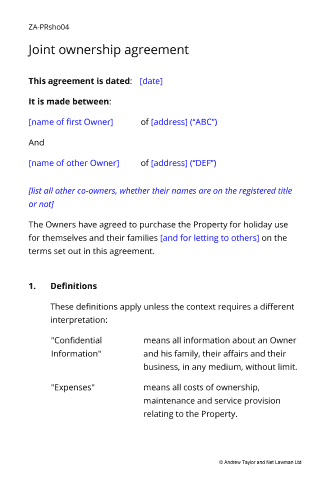Joint ownership agreement

Document overview


- Length:19 pages (5200 words)
- Available in:
 Microsoft Word DOCX
Microsoft Word DOCX Apple Pages
Apple Pages RTF
RTF

If the document isn’t right for your circumstances for any reason, just tell us and we’ll refund you in full immediately.

We avoid legal terminology unless necessary. Plain English makes our documents easy to understand, easy to edit and more likely to be accepted.

You don’t need legal knowledge to use our documents. We explain what to edit and how in the guidance notes included at the end of the document.

Email us with questions about editing your document. Use our Lawyer Assist service if you’d like our legal team to check your document will do as you intend.

Our documents comply with the latest relevant law. Our lawyers regularly review how new law affects each document in our library.
About this document
This fractional ownership agreement covers the situation where two or more people share ownership and use of a house, flat or other property for holiday occupation. The house or flat may be enjoyed by both owners (although not simultaneously for long periods of time) or rented to others for short stays.
Broadly, the contents of this document cover three areas: ownership, management and sale.
Under the South African law, the registration of ownership does not record the shares in which a property is held. It assumes ownership proportions are the same as the proportions that the owners contributed to the purchase price. So if the arrangement is that one owner puts down a larger share of the deposit, but the other pays the majority of the mortgage and is entitled to a share of the sale price as calculated by a formula of their joint devising, all of that needs to be recorded in an agreement such as this one.
This agreement can also record a beneficial interest – that is the share owned by someone who is not registered on the deeds. For example, that could be a family member who has loaned one of the owner’s money to contribute to the purchase price.
Expenses relating to maintenance and excessive use by one owner to the perceived detriment of the other are common reasons for the souring of the business relationship. By setting out who pays for expenses and upkeep, and how use of the holiday property is shared, arguments can be reduced.
This contract also lets you decide what happens if either side wants to sell his or her share, or the whole property. An investment in a holiday home can be significant, and it will be important to both sides that neither holds up a sale or reduces the price if the other wants out of the arrangement.
Features
- Suitable for ownership and use of a house, flat or other property for holiday occupation in the South Africa or abroad
- Not suitable for a business letting, a lease of more than three months or a residential tenancy
Alternative documents
If you are living with the other owner in the house or flat for significant periods of time, we have another ownership agreement for residential property
Contents
- Terms of beneficial interest
- Price and payment
- How many people allowed to occupy at one time and who they may be
- Who and how will manage payment of expenses
- Management
- Detailed management structure ordered by annual meetings of the owners, possibility of proxy voting
- Undertakings by the parties
- Alternative exit strategies to allow for a share to be sold to a third party, after offering it to all other owners
- Effect of termination
- What happens when someone wishes to sell
- Other legal provisions to protect your interest
- Explanatory notes to help you edit the document

Recent reviews
Very useful information. Would recommend to others.
Price very reasonable.
Choose the level of support you need
Document Only
This document
Detailed guidance notes explaining how to edit each paragraph
Lawyer Assist
This document
Detailed guidance notes explaining how to edit each paragraph
Unlimited email support - ask our legal team any question related to completing the document
- Review of your edited document by our legal team including:
- reporting on whether your changes comply with the law
- answering your questions about how to word a new clause or achieve an outcome
- checking that your use of defined terms is correct and consistent
- correcting spelling mistakes
- reformatting the document ready to sign
All rights reserved
